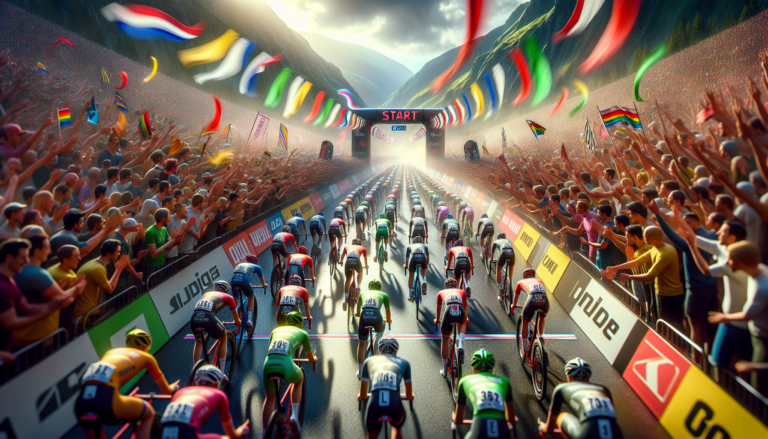Introduction to Cycling Events
Cycling events are an exhilarating way for enthusiasts to explore their passion for riding bikes while testing their limits and skills. Whether you’re a seasoned cyclist or just starting out, participating in cycling events can be a thrilling and rewarding experience. From local rides to international races, there’s a wide variety of cycling events to choose from, each offering its own unique challenges and excitement.
What Are Cycling Events?
Cycling events are organized gatherings where cyclists come together to ride, race, or simply enjoy the camaraderie of other like-minded individuals. These events can range from leisurely group rides to highly competitive races, catering to cyclists of all skill levels and interests. Some events focus on specific disciplines such as road cycling, mountain biking, or track cycling, while others may incorporate multiple disciplines into a single event.
Cycling events often have a festive atmosphere, with participants, spectators, and volunteers all contributing to the energy and excitement of the day. Many events include additional activities such as vendor expos, live music, and food and beverage offerings, making them a fun outing for the whole family.
Types of Cycling Events
There are numerous types of cycling events, each with its own unique format, rules, and challenges. Some of the most common types include:
- Gran Fondos: These are mass participation cycling events, typically featuring a long-distance route with challenging terrain. Participants can ride at their own pace and are often timed for personal achievement rather than competition.
- Criteriums: Criterium races take place on a closed circuit course, usually within a city or town center. Riders complete multiple laps of the course, with the winner being the first to cross the finish line on the final lap.
- Stage Races: Stage races are multi-day events where cyclists compete over several days, with each day featuring a different route or discipline. The rider with the lowest cumulative time at the end of all stages is declared the overall winner.
- Time Trials: In a time trial, cyclists race against the clock on a set course, starting at intervals. The rider with the fastest time wins.
- Charity Rides: Many cycling events are organized to raise funds and awareness for charitable causes. These rides often have a more relaxed, non-competitive atmosphere and welcome participants of all abilities.
No matter what type of cycling event you choose, you’ll find a welcoming community of fellow riders who share your passion for the sport.
Major Cycling Events Around the World
Cycling is a global sport, with major events taking place in countries around the world. From the iconic Tour de France to the grueling Giro d’Italia, these events attract top professional riders and millions of spectators. Here’s a look at some of the most significant cycling events worldwide.
USA Cycling Events
USA Cycling is the governing body for competitive cycling in the United States, overseeing a wide range of events and disciplines. Some of the most notable USA Cycling events include:
| Event | Description |
|---|---|
| USA Cycling Pro Road Championships | Annual event crowning the top U.S. professional road cyclists |
| USA Cycling Amateur Road National Championships | Multi-day event featuring road races and time trials for amateur cyclists |
| USA Cycling Mountain Bike National Championships | Off-road racing event determining the best U.S. mountain bikers across various disciplines |
| USA Cycling Cyclocross National Championships | Fast-paced, spectator-friendly racing event held on mixed terrain courses |
USA Cycling also provides resources for event planning, coaching, officiating, and more, supporting the growth and development of cycling nationwide.
Olympic Cycling Events
Cycling has been a part of the Olympic Games since the first modern Olympics in Athens in 1896. Today, Olympic cycling events include road cycling, track cycling, mountain biking, and BMX, with medals awarded in various disciplines for both men and women.
The Olympic cycling program continues to evolve, with new events added in recent years such as BMX freestyle and madison track racing. The Paris 2024 Olympic cycling road events are set to take place against the stunning backdrop of the city’s famous landmarks, including the Champs-Élysées and the Eiffel Tower.
European Cycling Events
Europe is the epicenter of professional road cycling, home to the sport’s three Grand Tours and most prestigious one-day races. The European cycling calendar includes:
- Tour de France: The world’s most famous cycling race, held over three weeks in July
- Giro d’Italia: The first Grand Tour of the season, known for its challenging mountain stages
- Vuelta a España: Taking place in late August and September, the Vuelta is the final Grand Tour of the year
- Paris-Roubaix: Nicknamed “The Hell of the North”, this one-day classic race is famous for its grueling cobblestone sections
- Tour of Flanders: The biggest race in cycling-mad Belgium, featuring narrow roads and short, steep climbs
These are just a few of the many prestigious cycling events that take place in Europe each year, attracting the world’s best riders and thrilling spectators with high-stakes racing drama.
Types of Cycling Disciplines
While road cycling may be the most well-known discipline, there are actually several distinct types of cycling, each with its own unique characteristics, equipment, and events. Understanding the differences between these disciplines can help you choose which type of cycling best suits your interests and skills.
Road Cycling
Road cycling is the most common form of competitive cycling, taking place on paved roads. Road cyclists typically ride lightweight, aerodynamic bikes and wear form-fitting lycra clothing to reduce wind resistance. Road cycling events can range from short criterium races to multi-day stage races like the Tour de France.
Within road cycling, there are several subdisciplines, including:
- Criterium: Short, fast-paced races held on closed circuits
- Time Trial: Solo races against the clock
- Stage Race: Multi-day events comprising various stages and race formats
Mountain Biking
Mountain biking takes place off-road, on trails ranging from gentle fire roads to highly technical singletrack. Mountain bikes are sturdier than road bikes, with wider tires, suspension systems, and more upright riding positions to handle uneven terrain. Mountain bike events include cross-country races, enduro races, and downhill competitions.
The main mountain biking subdisciplines are:
- Cross-Country (XC): Races held on diverse off-road terrain, requiring a mix of endurance and technical skill
- Downhill (DH): Gravity-fueled time trial races down steep, rough terrain
- Enduro: Multi-stage races featuring timed downhill segments linked by untimed uphill transfer stages
Track Cycling
Track cycling takes place on specially designed oval tracks called velodromes. Riders use brakeless, fixed-gear bikes to reach high speeds. Track cycling events include sprint races, endurance races, and team events, and are a major part of the Olympic cycling program.
Some of the most well-known track cycling events are:
- Sprint: A three-lap race between two riders
- Team Pursuit: Two teams start on opposite sides of the track and attempt to catch the other team
- Madison: A relay race with two-rider teams, named after Madison Square Garden where it was first held
Cyclocross
Cyclocross is a fall and winter discipline that involves racing laps on a short, mixed-terrain circuit. Courses typically include grass, dirt, sand, and obstacles requiring riders to dismount and carry their bikes. Cyclocross events are known for their festive, party-like atmosphere and passionate fans.
While cyclocross originated in Europe, it has grown increasingly popular in North America, with major events including:
- UCI Cyclocross World Championships: Annual event crowning the world’s best cyclocross riders
- USA Cycling Cyclocross National Championships: Determining the U.S. national champions in various age and skill categories
- UCI Cyclocross World Cup: Season-long series of races held around the globe
BMX
BMX (Bicycle Motocross) originated in the 1970s, with riders racing on dirt tracks on small, sturdy bikes. Today, BMX is divided into two main subdisciplines: racing and freestyle. In BMX racing events, riders navigate a series of jumps and berms in an all-out sprint to the finish line. Freestyle BMX focuses on performing tricks and stunts on ramps, boxes, and street obstacles.
Major BMX events include:
- UCI BMX World Championships: The pinnacle of BMX racing competition
- X Games: Annual extreme sports event featuring both BMX racing and freestyle competitions
- UCI BMX Freestyle Park World Cup: A series of freestyle events held in skatepark-style environments
With its high-flying action and youthful energy, BMX has become a popular addition to the Olympic program, with medals awarded in both racing and freestyle.
How to Participate in Cycling Events
Ready to experience the thrill of cycling events for yourself? Taking part in an organized ride or race can be exciting and fulfilling, but it’s important to make sure you’re prepared. Here’s a step-by-step guide to get you started.
Membership and Registration
Most cycling events require participants to have a membership with the relevant governing body, such as USA Cycling. Membership provides access to a wide range of resources and benefits, including event registration, racing licenses, insurance coverage, and training programs.
To register for an event, first check its specific requirements. Some events may have qualifying standards or be limited to certain age groups or skill categories. Be sure to sign up well before the registration deadline, as popular events can fill up quickly.
Training and Preparation
Once you’ve chosen an event, it’s time to start training! Depending on the length and difficulty of the event, you’ll want to build up your endurance and skills gradually. Some key training tips include:
- Set goals: Having a specific target to work towards will help keep you motivated
- Create a plan: Develop a structured training program that includes a mix of long rides, intervals, and rest days
- Ride with others: Joining group rides or finding a training partner can make the miles more enjoyable
- Practice nutrition: Experiment with different foods and drinks to find out what works best for you on the bike
- Dial in your equipment: Make sure your bike is in good working order and that you’re comfortable with your clothing and gear
As the event approaches, be sure to taper your training to arrive at the start line well-rested and ready to ride your best.
Event Day Tips
When event day arrives, it’s normal to feel a mix of excitement and nerves. To help things go smoothly, consider these tips:
- Review the course: Familiarize yourself with the route, noting any key climbs, turns, or feed zones
- Prep your gear: Lay out all your clothing and equipment the night before so you’re not scrambling in the morning
- Fuel up: Eat a nutritious breakfast a couple hours before the start, and bring snacks and hydration for the ride
- Warm up: Arrive with plenty of time to pick up your packet, make last-minute adjustments, and spin your legs
- Pace yourself: Avoid going out too hard in the early miles; ride within your limits and save energy for the finish
- Stay positive: Remember, everyone has good days and bad days on the bike – the most important thing is to have fun and learn from the experience
No matter your result, finishing a cycling event is an accomplishment worth celebrating! Soak up the post-ride atmosphere, swap stories with other participants, and start planning your next cycling challenge.
Resources for Cyclists
Whether you’re just getting started with cycling or you’re a seasoned racer, there are plenty of resources available to help you make the most of your time on two wheels. From online route planners to local bike shops, here are some of the best resources for cyclists.
Live Timing and Results
For those following major professional cycling races like the Tour de France, live timing and results are a must-have. Websites and mobile apps provide real-time updates on the race situation, with GPS tracking, time gaps, and intermediate sprint and KOM results.
After the stage or race finish, these same resources typically offer detailed results, standings, and highlights to help you analyze the day’s action. Some of the most popular live timing and results platforms include:
- Official race websites: Events like the Tour de France and Giro d’Italia have their own comprehensive live tracking and results pages
- FirstCycling: A website offering live coverage and results for a wide range of men’s and women’s professional races
- ProCyclingStats: Provides live race updates along with a deep statistical database of rider results and rankings
With these tools at your fingertips, you’ll never miss a moment of the racing action.
Event Planning and Hosting
For cycling clubs, teams, or organizations looking to host their own events, there are numerous resources available to help with planning and execution. USA Cycling offers a range of tools and guidance for event directors, including:
- Event Permitting: Assistance with obtaining the necessary permits and insurance for your event
- Race Director Resources: Guides on course design, safety planning, results and scoring, and more
- Officials Certification: Programs to train and certify race officials and marshals
- Event Promotion: Tools to help promote your event and reach a wider audience of participants
By tapping into these resources, event organizers can ensure a safe, successful, and enjoyable experience for all involved.
Coaching and Officiating
Cycling coaches and officials play a vital role in the development and smooth operation of the sport. Coaches help riders of all levels to improve their skills, fitness, and performance, while officials ensure the integrity and fairness of cycling competitions.
USA Cycling offers certification programs for both coaches and officials, providing them with the knowledge and tools they need to succeed in their roles. Coaching certifications are available at three levels:
- Level 3: The entry-level certification, focusing on the fundamentals of coaching
- Level 2: Intermediate certification for coaches working with more experienced athletes
- Level 1: The highest certification, for coaches working with elite and professional riders
Official certifications are discipline-specific, with designations for road, track, mountain bike, cyclocross, and BMX. Officials can progress through the ranks from entry-level moto referees to national and international commissaires.
By pursuing coaching or officiating education, passionate cycling enthusiasts can play an integral part in growing the sport and supporting athletes in achieving their goals.
Conclusion
Cycling events offer something for riders of all types – from recreational enthusiasts to hardcore competitors, from road racers to mountain bikers to track specialists. With a wide range of events to choose from and a welcoming community of participants, there’s never been a better time to get involved.
The Future of Cycling Events
As cycling continues to grow in popularity around the world, we can expect to see even more exciting cycling events in the years to come. Some emerging trends and developments to watch include:
- Gravel racing: One of the fastest-growing disciplines, gravel events combine elements of road and mountain biking on mixed-surface courses
- E-sports: Virtual cycling platforms like Zwift are introducing new formats for digital racing and competition
- Ultra-distance events: More riders are testing their limits in ultra-marathons and multi-day stage races
- Inclusive categories: Many events are adding non-binary and para-cycling categories to promote diversity and accessibility
No matter how the sport evolves, the core appeal of cycling events remains the same: the chance to challenge yourself, explore new places, and connect with a community of like-minded riders.
Get Involved in the Cycling Community
Ready to take the next step in your cycling journey? Here are some ways to get more involved:
- Join a club: Cycling clubs are a great way to meet other riders, learn new skills, and participate in group rides and events
- Volunteer: Many events rely on the support of volunteers to handle tasks like course marshaling, aid stations, and rider check-in
- Spectate: Watching a professional race in person is an unforgettable experience; look for events in your area and cheer on the pros
- Share your passion: Introduce friends and family to the joys of cycling; you never know who might catch the bug!
However you choose to engage with the cycling community, you’re sure to find a warm welcome and plenty of opportunities for fun, fitness, and camaraderie. So what are you waiting for? Pump up those tires, clip in, and start exploring the wonderful world of cycling events!
*Please note, this article is intended as a general overview and introduction to cycling events. Always consult the rules, guidelines, and safety recommendations of the specific event(s) you plan to participate in.






